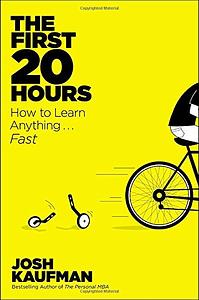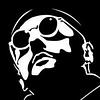You need to sign in or sign up before continuing.
Take a photo of a barcode or cover
All nonfiction March: Book 2
I've always found it easy to acquire new skills; I don't why I'm reading this. I just wanna see what the author has to offer in this book. I have low expectations, though.
..........
2.5 stars
Not really useful
I've always found it easy to acquire new skills; I don't why I'm reading this. I just wanna see what the author has to offer in this book. I have low expectations, though.
..........
2.5 stars
Not really useful
Mildly interesting, but I got the point in the first couple of chapters. I didn't really need to hear about the author's learning to program, windsurf, play the ukulele or play a Chinese board game. Would have been a nice magazine article.
Like many people, I have a ton of skills I would like to learn. In fact, the list is overwhelming. I know I’ll never have the time to tackle even a fraction of them. So I’ve been focusing on the things that interest me the most: blogging, painting, drawing, scrapbooking, card making, journaling, writing, baking. But even that pared down list seems overwhelming. I don’t have 10,000 hours to dedicate to each one of those pursuits. But then again, I also don’t want to become a world-class expert in any of them. I just want to be good — okay, maybe really, really good. So imagine my excitement when I came across this book. I can get really good in just 20 hours? REALLY? Wow. Awesome! Unfortunately, if it seemed that the premise of this book was too good to be true… well, it was. The first couple of chapters are wonderful. The author describes his theories, and they make sense. But after that brief introduction, he goes in depth into his own interests: yoga, programming, windsurfing, etc. I assumed he’d be talking about how he learned these skills, but instead, it’s almost as though he’s trying to teach us those skills. The content is extremely dry, and not helpful at all if you’ve got other skills you have to learn and have no interest at all in, say, learning to play Go. I was very disappointed. Such a great premise - so poorly executed.
While my interest in playing the ukulele and going windsurfing is minimal, I was interested in the programming and Colemak sections of this book, with a passing intrigue for yoga. I've actually tried to learn Ruby (on Codecademy) and got so far, and have never seriously contemplated using a keyboard with a different layout. But I am now. I'm seriously thinking of pulling out some of the keys on this Apple 1048 keyboard of mine I bought at an op-shop for $3 and going Colemak.
All up, a slight book that's mostly fun to read - and occasionally educational.
All up, a slight book that's mostly fun to read - and occasionally educational.
Good overview of rapid skill acquisition and learning along with 6 case studies.
All nonfiction March: Book 2
I've always found it easy to acquire new skills; I don't why I'm reading this. I just wanna see what the author has to offer in this book. I have low expectations, though.
..........
I've always found it easy to acquire new skills; I don't why I'm reading this. I just wanna see what the author has to offer in this book. I have low expectations, though.
..........
Josh Kaufman likes to do everything, include read the audio book. (He's not bad at it). The instructions of the book don't take too long to review. They are straightforward and clearly presented. The bulk of the book is Josh relaying his experiences learning some new skills. Interesting, but not altogether great as not enough is drawn to point out the connections between the steps and what he did. In any event there is hope for me to learn something new.
Disappointing. The first 20% of the book present some useful ideas how to aquire a new skill or learn something. The following 80% are stories about various skill, the author has developed. You want to save the money, read some of the other reviews on goodreads and you will know everything of value in this book.
MUST read for all Renaissance Souls who have a healthy addiction to learning!!! ;-)
A good overview of key principles to think through how you learn skills, but nothing too new here. Just a useful framework.





